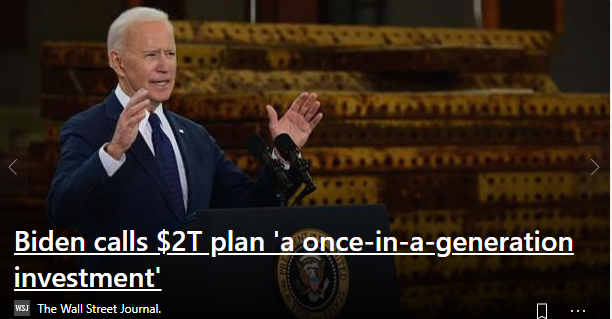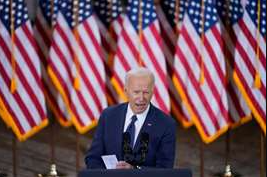Biden Unveils $2.3 Trillion Infrastructure Plan

 )
) “It’s not a plan that tinkers around the edges,” Mr. Biden said during a speech in Pittsburgh, where he kicked off his presidential campaign. “It’s a once-in-a-generation investment in America.”
The Democratic president cast his plan as a fundamental shift in economic thought away from the small-government, tax-cutting approach embraced decades ago under Ronald Reagan, a Republican.
“Here’s the truth: We all will do better when we all do well,” Mr. Biden said, arguing that the pandemic had exposed longstanding inequalities in the country. “It’s time to build our economy from the bottom up and from the middle up, not the top down.”
He said his plan isn’t an attack on wealthy Americans. “This is not to target those who’ve made it, not to seek retribution,” he said. “This is about opening opportunities for everybody else.”
The president’s advisers say the Covid-19 pandemic has helped change American attitudes about the role government should play in their lives, making political space for unprecedented investments that could reshape the country.
The measure, which comes after Mr. Biden signed a $1.9 trillion coronavirus relief bill into law, is the first of a two-part economic plan that he hopes to move through Congress in coming months. A second plan focused on child care, healthcare and education will be released in April. Combined, Mr. Biden’s economic proposals are expected to cost between $3 trillion and $4 trillion over a decade, according to people involved in the discussions.
Mr. Biden’s infrastructure proposal faces hurdles, including GOP opposition to significant tax increases, disagreements among Democrats about how to pay for the package and progressives’ concerns that it isn’t ambitious enough.
The infrastructure plan would cost roughly $2.3 trillion over eight years and be paid for over 15 years by raising the corporate tax rate to 28% from 21% and increasing taxes on companies’ foreign earnings. The tax changes would revamp or replace much of the international tax structure congressional Republicans established four years ago in the law signed by then-President Donald Trump.
Mr. Biden’s proposal includes $621 billion to modernize transportation infrastructure, $400 billion to help care for the aging and those with disabilities, $300 billion to boost the manufacturing industry, $213 billion on retrofitting and building affordable housing and $100 billion to expand broadband access, among other investments.
The plan, which requires congressional approval, calls for modernizing 20,000 miles of roadway; building 500,000 electric-vehicle charging stations; replacing the country’s existing lead pipes and service lines; repairing aging schools; expanding home care for the elderly and disabled; and investing billions of dollars in domestic semiconductor manufacturing. Mr. Biden also proposes mandating that more of the country’s electricity be generated from low-carbon sources, with a goal of eliminating carbon emissions from the power grid by 2035.
Mr. Biden’s plan stresses equity in access to jobs and transportation options, including $20 billion for a new program that would reconnect neighborhoods cut off by past transportation investments as well as research funding for historically Black colleges and universities. The plan calls for a national climate-focused laboratory to be affiliated with an HBCU.
The plan’s rollout will kick off months of negotiations between the White House and Capitol Hill, as well as a wave of lobbying by business and industry groups. White House officials acknowledged that the shape of the package could change as lawmakers—eager to put their stamp on it and score victories for constituents—offer up their own proposals. Mr. Biden’s advisers hope Congress will pass it this summer.
“I’m open to other ideas, so long as they don’t impose any tax increase on people making less than $400,000,” the president said.
Republicans and Democrats have struggled in recent years to pass major infrastructure legislation, disagreeing over how much to spend and how to finance it. Republicans are especially unlikely to agree to reverse the 2017 tax law that they supported enthusiastically.
Given likely GOP opposition, some Biden advisers and congressional Democrats are considering a budgetary maneuver to advance the measure without Republican support—as they did with the Covid-19 aid package—which would require almost every Democrat to stick together.
Keeping the party united could prove complicated as both moderate and progressive lawmakers jockey to see their favored issues addressed in the bill.
Reps. Tom Suozzi (D., N.Y.), Bill Pascrell (D., N.J.) and Josh Gottheimer (D., N.J.) said this week that they wouldn’t back any tax-code changes unless Congress restores the deduction for state and local taxes, which is now capped at $10,000 under the 2017 tax law. Democrats control the House 219-211, so they can lose no more than three votes on legislation that all Republicans oppose.
Progressives said the infrastructure proposal doesn’t meet the scale of the challenges facing the country, including climate change. Congressional Progressive Caucus Chairwoman Rep. Pramila Jayapal (D., Wash.) said on Wednesday that the package “can and should be substantially larger in size and scope.”
She noted that Mr. Biden had campaigned on spending $2 trillion over four years on climate and infrastructure-related projects, half the time frame outlined in his new plan. It “makes little sense to narrow his previous ambition on infrastructure or compromise with the physical realities of climate change,” Ms. Jayapal said.
Even Democrats who broadly agree with the Biden administration’s goals indicated they would seek modifications. Sen. Ron Wyden (D., Ore.), who leads the Senate Finance Committee, said Wednesday that he was preparing his own proposal to overhaul international tax rules.
Some Democratic activists who lined Mr. Biden’s route to the Pittsburgh event with signs are pushing for him to include a pathway to citizenship for essential workers who are in the country illegally. Julia Aviles Zavala, a member of immigration advocacy group CASA, said there was a connection between the two issues because some workers on infrastructure projects fall into that category.
A senior administration official said the type of spending outlined in the package has garnered bipartisan interest previously, adding that the president was open to ideas on structuring and financing the plan. Mr. Biden will hold his first cabinet meeting on Thursday, the White House said, where he is expected to discuss the infrastructure plan with his senior aides.
Senate Minority Leader Mitch McConnell (R., Ky.) said Mr. Biden called him Tuesday to discuss the plan, which Mr. McConnell said appeared to be only nominally about infrastructure. Mr. Biden said in Pittsburgh that he would invite Republicans to the Oval Office to talk about the proposal.
“If it’s a Trojan horse for a massive tax increase, put me down as highly skeptical,” Mr. McConnell said Wednesday at an event in Kentucky, adding that the proposal appeared to involve “not only significantly more borrowing, but raising taxes on the most productive parts of our economy. This is not a very bipartisan period we’re in right now.”
Sen. Kevin Cramer (R., N.D.) said he was open to working with Democrats on certain measures like expanding the Highway Trust Fund or easing regulations to lower the cost of transportation projects, but added that he thought Mr. Biden’s proposal went beyond just infrastructure.
“I worry that by using one of the most bipartisan policies in Congress as a tool for much more partisan goals like climate and taxes, President Biden will squander whatever remaining goodwill he has with Republicans,” Mr. Cramer said.
It is unknown how much of Mr. Biden’s coming healthcare and education package would be paid for through tax increases, but White House officials are weighing additional proposals.
The first package contains corporate tax proposals and none of Mr. Biden’s main campaign proposals to raise taxes on top earners’ individual income, capital gains, estates and noncorporate businesses.
Under the president’s plan, the corporate tax rate would rise to 28% from 21%, putting it halfway between the previous 35% tax rate and where Republicans set it in 2017. It would push the U.S. corporate tax rate back toward the top of the pack among major economies, a change that business groups are already warning would discourage investment.
“Policy makers should avoid creating new barriers to job creation and economic growth, particularly during the recovery,” Joshua Bolten, president and chief executive officer of the Business Roundtable, said Tuesday.
Democrats contend that the 2017 tax law cut taxes too deeply and contains several features that encourage companies to put profits and operations abroad. The Biden plan would reverse several of those.
Notably, the plan would set the minimum tax on U.S. companies’ foreign income at 21%, up from 10.5% today, and it would set that tax so it applies to profits earned in each country, rather than letting companies combine their income globally. Administration officials said that would limit companies’ ability to book profits in tax havens, while businesses warn of complexities and unforeseen consequences.
White House aides said the proposal is paid for, but not in the way that Congress typically measures such things. It would take 15 years of the corporate tax increases to cover the one-time infrastructure expenses over eight years, though the tax increases would remain after that point.
Write to Tarini Parti at [email protected]